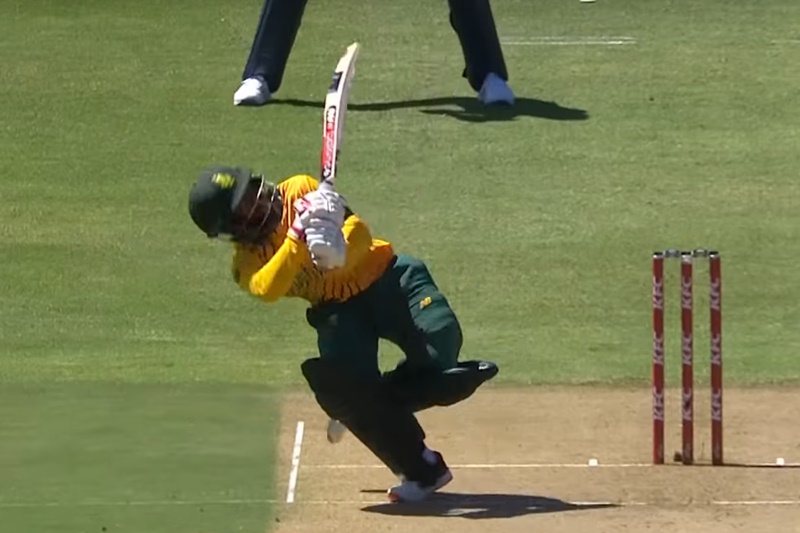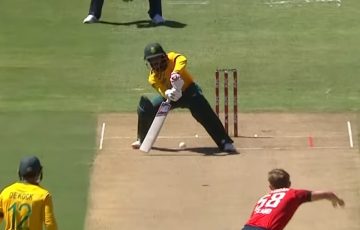“Bazball” is an ill-defined woolly-yet-squidgy concept that you can smush around to mean pretty much anything you want. We’ve been here before.
Speaking ahead of South Africa’s home one-day series against England, captain Temba Bavuma spoke about his team’s way of going about things and how they might look to improve.
“There’s nothing wrong with us taking a little bit from England, putting it together and seeing what comes about with the personnel we have,” he said. “Guys going out and expressing themselves. If that equates to a South African ‘Bazball’ way of playing – to use a stupid term – then so be it. If it means we are going to go out there and block the shit out of the ball, so be it.”

A first important thing to note here is that Bavuma is listing ‘a South African version of Bazball’ and ‘blocking the shit out of it’ as two distinct options. A second important thing to note is that England’s one-day team don’t play whatever-the-hell-Bazball is because Brendon “Baz” McCullum isn’t the coach, Matthew Mott is. A third important thing to note is that Bavuma is continuing a rich tradition of South Africa being the only nation who aren’t at all afraid of being seen to be not merely willing to block the shit out of it, but perhaps even actively passionate about doing so.
Despite his laying them out as two different things, people are already interpreting this quote as, “Bavuma wants to play a ‘blocking the shit out of it’ version of Bazball.”
This is the way it goes. Next thing you know, blocking the shit out of it will become a widely accepted aspect of Bazball (and fair enough in a way because the best interpretation is that it’s all about playing with conviction). But you’re then into the territory where almost any way of playing any format of cricket successfully will be considered ‘Bazball’. It’s surely not long until we all move onto a new term and start broadening the meaning of that out to a point where it doesn’t really serve any linguistic purpose any more.
These ‘brands’ all go the same way eventually.
At one point “aggressive cricket” came to be seen as the best way of approaching the sport. In fact it became not just a great way of going about things, but the only way. This resulted in the kind of post hoc redefinitions that saw Shane Warne claim that, “aggressive play can also be about wearing down your opposition and letting the ball go well to keep them out in the field for long periods of time.”
Then there was “positive cricket” which was initially synonymous with “attacking cricket” which itself meant the same as “aggressive cricket” with all of these terms gradually coming to mean nothing more than “good cricket”.
When grim, defensive, spoilsport cricket inevitably proved necessary and effective, everyone immediately agreed that “positive cricket” definitely incorporated “negative cricket”.
Why not sign up for, at most, one King Cricket email a day, more likely three a week? Details and reassurances here.






To get in ahead of you all… In other news, the U19 T20 World Cup eh?
https://www.espncricinfo.com/series/icc-women-s-under-19-t20-world-cup-2022-23-1336137/australia-women-under-19s-vs-england-women-under-19s-2nd-semi-final-1336194/full-scorecard
Just loved getting home to find that scorecard, KC. I had seen the scorecard just once earlier – England diddly-squat-for-seven and thought “oh well”.
But now I realise I should have thought, “our girls can still win from there. Shuv it – England Women’s Under 19s are the best cricket team in the whole world”.
On the other matter, should we be calling the ODI equivalent of Bazball “Mothball”? Like you, I find these stupid terms repulsive. The raison d’etre of a mothball is to be repulsive.
Crickott?
Mattbat?
Or in homage to Vittorio Pozzo, perhaps Il Mattodo/Il Mottodo?
Matthew Mott is far too good a name not to squeeze a ridiculous “branding” out of – though I have to admit I liked “mothball”.
Anything’s bazball. Everything’s bazball. Nothing is bazball.
We have well and truly entered the zen territory here.